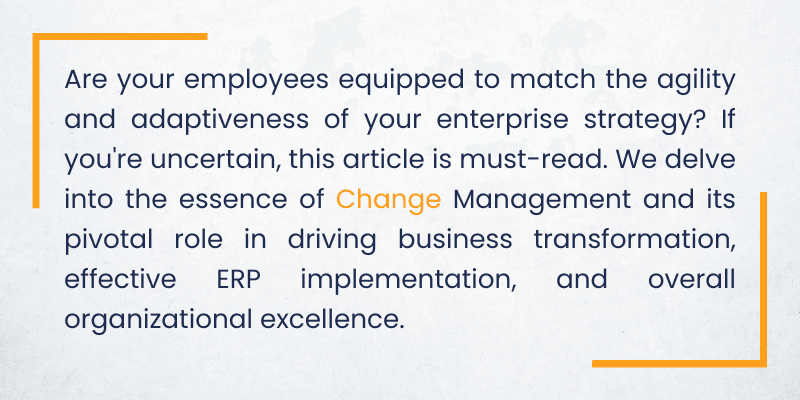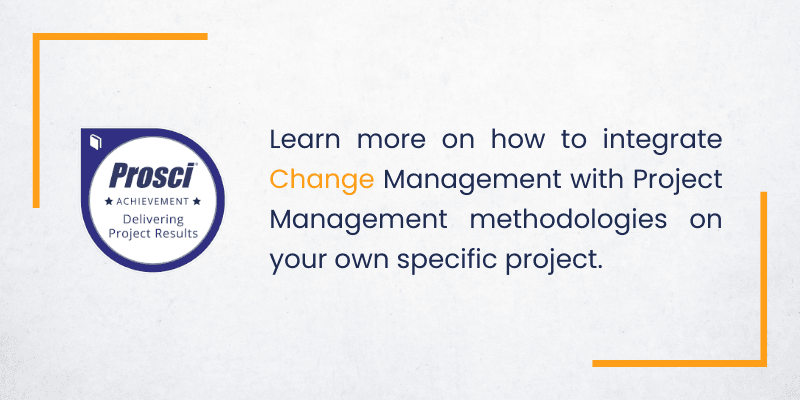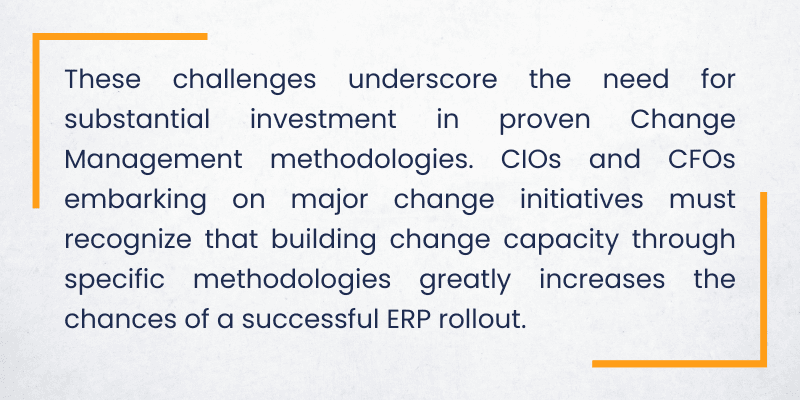

Change Management Blog
The Vital Role of Change Management in Business Transformation and ERP Implementation
July 24, 2023
Time to read: 3 Min

The Strategic Imperative of Change Management in Business Evolution and ERP Deployment
At the heart of any successful business transformation lies Change Management.
This discipline is the cornerstone in steering organizations through significant transformational transitions ensuring that the workforce is not just prepared but is also capable and willing to embrace the new directions. In an era where business landscapes evolve at breakneck speed, the agility and adaptability of employees must align with the strategic imperatives of the organization.
In today's rapidly evolving business landscape the ability to adapt swiftly is crucial. The question is, are your employees as agile and adaptable as your enterprise strategy demands? Probably not as much you would want them to.
This gap highlights the importance of deepening our understanding of Change Management principles. By doing so, we unveil how a deep comprehension of these principles is not just beneficial but crucial for catalyzing business transformation and ensuring the triumphant execution of ERP implementations. This journey is not just about implementing change; it's about fostering a culture where change is not merely tolerated but is actively sought and embraced, ensuring alignment with organizational goals and aspirations.
To grasp the significance of Change Management in enterprise success, we begin with a pivotal inquiry: Why ERP Change Management is Essential for Enterprises?
The answer is clear:
The answer lies in the complexity and investment intensity of Enterprise Resource Planning (ERP) systems.
By their very nature, ERP Systems are sprawling, complex, and deeply integrated within an organization's digital backbone. They demand substantial investment and bring about significant shifts in how daily business operations are conducted. However, the challenge does not end with the technical deployment of these systems. The real test lies in managing the transition – in ensuring that the workforce, ingrained in their routines and comfort zones, is ready to step into this new era.

Consider the statistics highlighting the hurdles in ERP implementation: issues like understaffing leading to cost overruns in nearly 40% of organizations. These aren't just numbers; they are a clarion call for robust & well-structured Change Management strategies.
Companies like ERP vendor Oracle have pinpointed these critical key challenges encountered during ERP adoption and implementation:
Project Management and Planning: ERP projects, encompassing phases from discovery to post-launch evaluation, often require more time and resources than anticipated.
Data Integration and Quality: Challenges in managing and migrating data can represent up to 15% of the total ERP expenses.
Cost and Timeline Overruns: A lack of internal resources for managing extensive organizational changes led to budget and schedule deviations in around 50% of ERP projects.
Effective Change Management: Transitioning to new software is a standard part of the process. However, ensuring the adoption of these changes and overcoming resistance among key stakeholders introduces an additional layer of complexity. Data from Prosci’s Best Practices in Change Management research shows that initiatives with excellent Change Management are 7X more likely to meet objectives than those with poor Change Management. Simply moving from “poor” to “fair” Change Management increases the likelihood of meeting objectives by 3X.

RelatedBlog Articles
Sponsor Role
Why is ERP Change Management Essential for Enterprises?
Top-down Change Management Approach for ERP Implementations.



